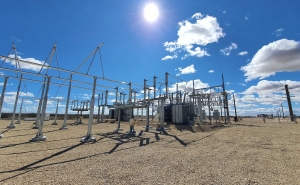Layer1, the U.S. bitcoin mining startup backed by high-profile investors, has misdescribed the role of a supposed core team member in a recent pitch deck, according to that team member.
The full deck – which was shared with CoinDesk by an investor who received it from Layer1 around June – shows a management team slide in which Layer1 told potential investors that Liu Xiangfu, co-founder and a former director of Chinese bitcoin miner maker Canaan, is its Head of Supply Chain.
Further, in the equity structure slide, the deck described Liu as a founding member of the firm with an ownership stake.
However, when reached for comment, Liu said he is not involved in Layer1’s business. “I introduced some of my friends to them. … That did help them when they [came] to China. But I’m not a shareholder [and do] not work for them,” Liu said via WeChat messages.
The discrepancy came to light as Layer1, which has been backed by PayPal co-founder Peter Thiel and CoinDesk’s parent company Digital Currency Group, has been working to raise $50 million in senior secured debts since June, according to a separate term sheet seen by CoinDesk and confirmed by Layer1.
The U.S. startup boasts a mission of not just building top-notch bitcoin mining facilities but also launching the U.S’s first proprietary mining chips to compete with Chinese miner makers.
Although the pitch deck does not specify a date, it includes a roadmap that suggests the deck is recent as of June of this year. According to the roadmap, Layer1’s Step 4 – a 25 megawatt-hour (mWh) bitcoin mining farm at its Texas site – was up and running as of June, as featured in a Forbes article in late May.
Responding to CoinDesk’s questions regarding the timeline of the pitch deck, Layer1’s Series A equity financing and Liu’s characterization of his role, Layer1’s co-founder and CEO Alexander Liegl said on Aug. 20:
“I can confirm that the information you’ve received is correct, however there is a disconnect with regards to Liu Xiangfu’s involvement with Layer1. Xiangfu has been a good friend, and supportive of the company since the very beginning. It should be no surprise to anyone who follows our business to see Xiangfu’s name connected with Layer1.”
In addition, the management team slide also claims Layer1’s chief technology officer, Ivan Kirillov, was a former lead engineer for four years at cloud mining firm Genesis Mining.
However, Marco Streng, founder and CEO of Genesis Mining, told CoinDesk that Kirillov was not a lead engineer at Genesis Mining. “He [Ivan] worked together with our engineering team as an external [contractor]. He was not employed by Genesis Mining,” Streng said.
$50 million Series A
Also notable in this recent pitch deck is that it says Layer1 was still raising $50 million in Series A financing, which will be used to scale its operating mining capacity in West Texas to 150 mWh and to deliver its proprietary mining chips in mass production.
CoinDesk reported on Oct. 15, 2019, that Layer1 raised $30 million in the Series A round and had not yet reached its $50 million target.
Layer1’s own blog post published on the same date didn’t indicate how much it actually raised at the time and only said it had notable investors like Thiel and Shasta Ventures, at a valuation of $200 million.
But it appears only a relatively small part of the raised fund came from external investors at the time, as the recent pitch deck shows that “Layer1 founders have contributed over $23 million of [their] own capital so far to this Series A financing.”
Nonetheless, several business outlets, including Fortune and the Wall Street Journal, reported on Oct. 15 that Layer1 announced it raised $50 million in the Series A round. Forbes reported the same a few days later.
Liegl confirmed in a follow-up email response on Aug. 21 that Layer1 had not been raising a second round of Series A in recent months, but was trying to complete the previous round.
In a private Zoom call in April, Layer1 was offering shares worth $41 million to investors on the BnkToTheFuture crowdfunding platform, according to a live stream of the call.
In fact, Layer1’s profile page on BnkToTheFuture also shows it listed Liu as a team member in charge of supply chain when pitching to investors.
Jakov Dolic, Layer1’s then-president, who was also on the April call, described Liu’s role as “a team member and a friend.” Dolic left the firm in recent months but remains a shareholder.
When asked during the call, Liegl told investors on BnkToTheFuture the offering was the same round as the previous Series A financing with the same terms.
Data from BnkToTheFuture shows Layer1 collected $41 million on the crowdfunding platform. And Liegl said in the Aug. 21 response that Layer1’s $50 million Series A is now complete.
Proprietary chips?
One of Layer1’s missions is to take on Chinese bitcoin miner manufacturers and roll out the U.S’s first proprietary mining chips. Currently, almost the entire bitcoin miner manufacturing market is dominated by Chinese firms including Bitmain, Canaan, MicroBT and InnoSilicon.
Liu’s experience as one of the co-founders of Canaan in 2013, which is reported to have over 20% of the mining manufacturing market share, could have boosted Layer1’s expertise on that front.
As Layer1 promoted in its pitch deck, its management team has the experience of having produced mining hardware “with a global market share of 14%.” Without Liu, it would be questionable whether that is still the case.
But Layer1 is adopting a different model from the one taken by companies such as Bitmain or Canaan.
All major bitcoin miner makers in China are essentially fabless manufacturers, meaning they have in-house staff to design application-specific integrated circuit (ASIC) chips for the Bitcoin system’s SHA-256 algorithm.
But they don’t actually make the chips. Instead, they outsource from semiconductor foundries such as Samsung Foundry or TSMC, which fabricate the wafer silicon that can be customized into ASIC chips.
Instead of designing the chips in-house, Layer1 said in the pitch deck it’s working with a fabless manufacturer in Beijing called Ingenic Semiconductor, which obtains wafers from Samsung Foundry in order to design and produce chips for Layer1.
Layer1 touted in the deck that mining chips designed by Ingenic will be 10-nanometer (nm) chips with power consumption of 38 watt per terahash second (W/THs) of computing power. That would be as efficient as the most advanced equipment from Bitmain and MicroBT.
But according to Ingenic’s 2019 financial report published on the Shanghai Stock Exchange earlier this year, its main product lines currently focus on 28- and 22-nm chips.
In the email response on Aug. 21, Layer1 said Ingenic aims to start a full mask tape-out starting in December 2020, which is a process of ordering wafers to run a full test of the chips’ designed efficiency before mass production.
In the call with BnkToTheFuture investors, Liegl claimed Ingenic takes a minor stake in Layer1 so that his firm can get chips at cost without needing to pay a profit margin to Ingenic.
One-gigawatt ambition
The pitch deck shows that Layer1’s upcoming plan in November is to scale up its available power capacity by nearly seven times from 150 mWh to a whopping 1 gigawatt-hour (gWh).
According to the deck, Layer1 purchased a 150 mWh substation plus 30 acres of land in West Texas with self-funded capital last September. But as of June, it was fulfilling less than one-sixth (25 mWh) of that capacity by using Bitmain’s AntMiner S17s.
Layer1 said in the deck that it plans to fulfill the remaining available capacity with its custom mining chips following mass production.
If a mining facility can run at a full capacity of 150 mWh using bitcoin miners with the claimed 38 W/THs efficiency, then the site would be able to have around 40 million TH/s of computing power, or about 3% of the Bitcoin network’s total.
Based on U.S. mining pool Luxor’s bitcoin hashrate index, this amount of computing power alone would be worth about $100 million.
But this plan also faces roadblocks as Layer1 may have to first deal with a legal case that could create uncertainties for its mining operations’ efficiency. A data center power management firm in the U.S. is currently suing Layer1 over patent infringement.
In the Forbes article in May, Layer1 claimed that by using the so-called “demand-response” technology, it can reduce the electricity cost for its bitcoin mining operations to as low as $0.01 per kilowatt-hour.
That would be a major selling point of Layer1’s mining facility because the mining industry’s average cost is around $0.05 per kilowatt-hour.
However, Lancium, the plaintiff, said it has patented such technology in March of this year and alleged Layer1’s usage of this model violated its patent.




